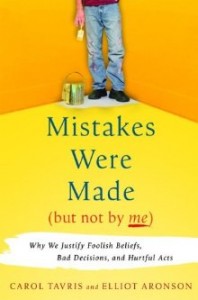 In 1998, Newt Gingrich was the Republican Speaker of the House who guided the impeachment of Bill Clinton for lying about an affair. He talked piously at the time about family values and how Clinton wasn’t fit to be president because of his transgressions. At the same time, Gingrich was cheating on his own wife. Even now, the man doesn’t see anything hypocritical about this.
In 1998, Newt Gingrich was the Republican Speaker of the House who guided the impeachment of Bill Clinton for lying about an affair. He talked piously at the time about family values and how Clinton wasn’t fit to be president because of his transgressions. At the same time, Gingrich was cheating on his own wife. Even now, the man doesn’t see anything hypocritical about this.
U.S. Rep. Debbie Wasserman Schultz is the chair of the Democratic National Committee. In 2009, she criticized GOP presidential candidates who had opposed Barack Obama’s bailout of General Motors and Chrysler by saying, “If it were up to the candidates for president on the Republican side, we would be driving foreign cars; they would have let the auto industry in America go down the tubes.”
There’s only one problem. Schultz drives a foreign car — a 2010 Infiniti FX35 with a personalized license plate bearing her initials. A spokesperson for the DNC didn’t see any hypocrisy in this, of course, but saw it as merely a Republican diversion from the issues.
We could easily cover dozens of incidents of hypocrisy — by supporters of both sides of the mainstream — but you get the point. If you do a web search for political hypocrisy or political double standards, what you’ll find is hundreds and hundreds of articles by people blasting the serious hypocrisy of the other side, but I haven’t been able to find a single word about the fact that hypocrisy is the biggest bi-partisan aspect of politics.
All day Thursday, I saw conservative Republicans blasting Marianne Gingrich and ABC News because of the charges she made in an interview with the network. To me, the woman comes across as a credible witness who testifies about her ex-husband’s deep dishonesty and lack of ability to be trusted. But I saw and heard Newt Gingrich’s supporters call her all sorts of names, most of which use language I wouldn’t repeat here. Why are they attacking her when all she is doing is pointing out the hypocrisy of her ex-husband?
I’d like to suggest that what’s going on in each of these cases is cognitive dissonance. When people are presented with two contradictory pieces of information, it creates feelings of discomfort in their brains. In order to get rid of that discomfort, they’re forced to unconsciously (or sometimes even consciously) discard one piece of information — so they won’t be faced with such an open contradiction.
In the minds of Newt Gingrich supporters, they already have firmly established in their minds the fact that he is a conservative champion who stands for their kind of values. For many of those people, the values he stands for are social conservative positions. This is the evaluation they’ve given him over the years. So when they’re faced with new information that’s in conflict with that — such as finding out that he’s a serial cheater and long-term liar who changes his positions when it’s politically convenient — they have to either reject the new information or decide they’ve been wrong about him in the past.
The cognitive dissonance of facing both of those positions forces them to choose one or the other, so the vast majority choose to disbelieve the new information. They can combine that with the long-established assumption that “the media” are out to get conservatives, and they have a nice story line that suggests that a lying and bitter ex-wife is teaming up with the “liberal media” to bring down a conservative. They might even end up more devoted to Gingrich than they were to start. And, oh yeah, if it does does turn out to be true, well, everybody does it, so it’s not a big deal if one of our guys does it, too.
The same sort of thing would be going on in the minds of unthinking Democrats who might defend Schultz. If the reverse case were true, they would be yelling about a double standard, but it’s different when it’s one of their own. After all, Schultz voted the right way on the issue, so her personal preference of her own vehicle didn’t matter. Right? In the same way that Gingrich voted the way conservatives wanted him to vote, so they were willing to excuse his personal behavior.
 If you’d really like to know more about the cognitive dissonance that causes these double standards, I highly recommend a book called “Mistakes Were Made (But Not By Me): Why We Justify Foolish Beliefs, Bad Decisions, and Hurtful Acts.”
If you’d really like to know more about the cognitive dissonance that causes these double standards, I highly recommend a book called “Mistakes Were Made (But Not By Me): Why We Justify Foolish Beliefs, Bad Decisions, and Hurtful Acts.”
In this book, a pair of social psychologists explain why the human brain is wired for self-justification. They show examples of how we fool ourselves in various areas of life, ranging from politics to police work to romantic relationships. When I read this book about four years ago, it helped me to make sense of a lot of things that didn’t make sense about the world around me. You probably look at other people and wonder why they could be so contradictory and confusing. What you’ll learn is that they’re wondering the same thing about you.
If you already opposed Newt Gingrich before this latest evidence came out, you might be looking at the Gingrich supporters and thinking that they must be idiots to still support him after this. (That’s my emotional response, too.) But you need to understand that you’ve almost certainly made similar errors. I’m sure I have, although I’d much rather assume that I’m the only truly consistent and rational person on the planet.
When you get right down to it, it’s this sort of insane self-justification that will always doom democracies. The theory is that educated and informed people will listen to the facts and come to rational decisions in the best interests of everybody. Even if every single person in the system were to honestly try that — and it can’t ever be that good anyway — it’s not possible for us to come to mutually beneficial solutions. You’re always going to believe your solution is better than mine. I’m always going to assume that my solution is better than yours. We’re both going to justify ourselves as being right.
Whichever political group you’re a part of, you almost certain see yourself as being part of the group that makes sense. The other groups are unreasonable and irrational and a dozen other things. Even though you’re sure you’re right, they’re just as sure that they’re the only reasonable and rational group. That’s just the way human nature works.
We’re not going to be able to rationally convince each other to change our minds — because we make decisions for unconscious emotional reasons and then we dress them up with logical-sounding words that justify what we’ve already decided.
We’re all deceiving ourselves. Some of us are a bit more aware of the self-deception than others are, but it doesn’t mean it’s a pleasant reality to understand.
 Self-compassion is difficult when harsh inner judge condemns you
Self-compassion is difficult when harsh inner judge condemns you End of life brought cancer patient to baptism six days before death
End of life brought cancer patient to baptism six days before death By end of Pooh movie, I wanted to stay in the Hundred-Acre Wood
By end of Pooh movie, I wanted to stay in the Hundred-Acre Wood